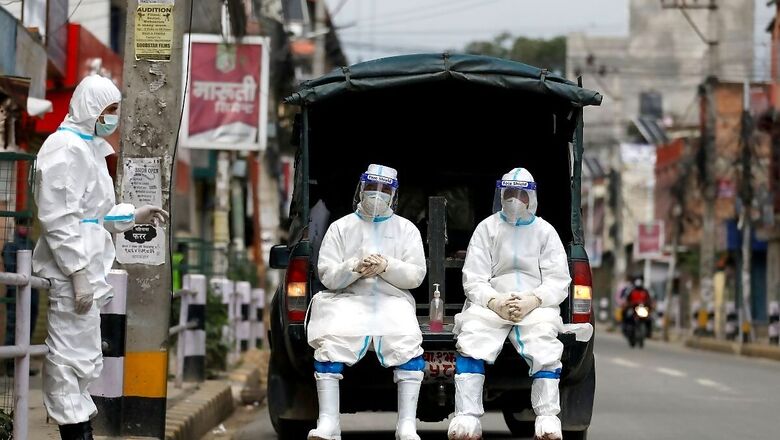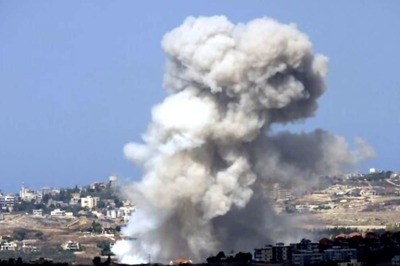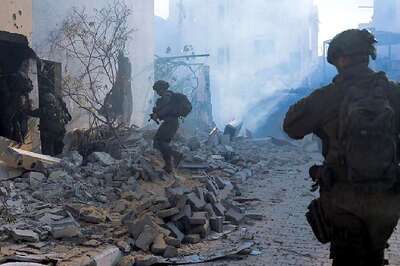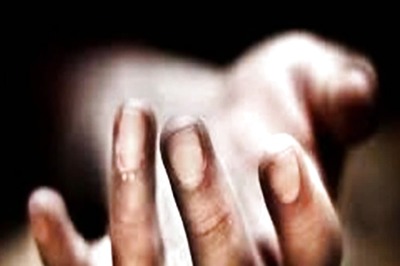
views
AIIMS Director Dr Randeep Guleria on Saturday warned that if Covid-appropriate behaviour is not followed and crowding not prevented, the next wave of the viral infection could strike the country in the next six to eight weeks.
Fears of a third wave have been rampant, even as the effects of the devastating second wave in India in April and May remain to be mitigated. India saw spiralling infections, increased fatality, shortage of healthcare facilities and medical oxygen amid a peak of cases. Lockdowns and strict restrictions were also initiated in most parts of the country to combat the disaster.
Now that cases have begun to come down, and curbs get relaxed, experts are warning of an impending third wave, which some say would affect children more.
How should one take precaution, and what to expect next? Here is your all-you-need-to-know guide to the impending Covid third wave:
When is the third wave expected to hit India?
Earlier, India’s epidemiologists had indicated that a third wave of COVID-19 is inevitable and is likely to start from September-October. However, Dr Guleria said on Saturday that it might arrive in the next six to eight weeks until Covid-appropriate behavior is followed aggressively, along with stricter surveillance and area-specific lockdowns in case of a significant surge.
A snap survey was recently conducted by Reuters between June 3-17 wherein 40 specialists, including doctors, scientists, virologists, epidemiologists and professors from around the world, were asked when they expected the third wave to hit.
Over 85% of the survey respondents, or 21 of 24, said the next wave will hit by October, including three experts who predicted that the pandemic may hit again as early as August, while another 12 said it is likely to strike in September. The remaining three experts said the third wave may come between November and February.
Will it be deadly for children?
Health Ministry officials and Dr Guleria have reiterated often that there is no evidence to suggest that children will be affected more in the next wave of the infection.
However, some experts believe the upcoming wave may prove more deadly for children. In the poll conducted by Reuters, nearly two-thirds of experts, when asked if children and those under 18 years would be most at risk in a potential third wave, said yes.
“The reason being they are a completely virgin population in terms of vaccination because currently there is no vaccine available for them,” Dr Pradeep Banandur, head of epidemiology department at National Institute of Mental Health and Neurosciences (NIMHANS), was quoted as saying in the report.
On Friday, addressing concerns around impact of third coronavirus wave on children, Luv Aggarwal, Joint Secretary, Health Ministry, said: “It may not be true that children will be disproportionately affected in the third wave as the serosurvey shows seropositivity was almost equal in all age groups. But the government is not leaving any stone unturned in terms of preparations.”
In a study, the World Health Organisation and the All India Institute of Medical Sciences have said that a possible third wave may not affect children in any disproportionate way. The finding was been based on a seroprevalence study done in five states on a sample size of 10,000. Covid-19 seroprevalence in the age group below 18 is 55.7 per cent and above 18 is 63.5 per cent.
Will the third wave be better controlled than the second?
Experts have said the third wave of Covid-19 in India may be better controlled than the second due to a lot of factors. The opinion poll conducted by Reuters said the wave will be controlled better as many people will be vaccinated by then. It added that the number of cases will be much less than what India witnessed in the second wave.
Dr Guleria has said the third wave will be more controlled, as cases will be much less because more vaccinations would have been rolled out and there would be some degree of natural immunity from the second-wave.
While many of the experts predicted the vaccination drive would pick up significantly in the coming months, they cautioned against an early removal of restrictions, as some states have done.
Lockdowns and Restrictions, Norms Crucial
However, some experts have maintained that the third wave may still prove to be extremely difficult. Dr. Suranjit Chatterjee, a senior consultant at Apollo Hospitals, warned that if safety norms are not followed by people and if there is no strict enforcement in case of violations, then “we are in for a trouble again”.
“The way cases have come down from over 28,000 at peak in April to 131 cases reported yesterday, it is such a dramatic fall in numbers. And, if lockdown was the primary reason for it, then we have to tread very cautiously now with the restrictions being slowly eased,” he told PTI.
“But, if people show laxity by not wearing masks or wearing it inappropriately or violate social distancing norms, and if law enforcement agencies do not penalise and ensure violations do not increase in quantum, then we are certainly in for a trouble. And, the next wave could be worse than the second wave situation,” he said.
Medical experts in mid-May had concurred that it was lockdown majorly that had brought down the count of daily cases, while cautioning that the severity of cases was still the same. Dr Richa Sareen, consultant of pulmonology at Fortis hospital here, who recently lost her immediate family member to Covid, said, “The threat of the third wave hitting is quite real and not a hypothesis.” “And, we had similar threat in February when everyone had started going on a vacation or doing house parties or socialising in public places. Now, that the second wave has done so much damage and claimed so many lives, we need to realise that we have to be disciplined and tread with caution, ” she said.
The pulmonologist emphasised that in the second wave, at least one member in every household here was either infected by Covid, or the families knew of someone who had been. “We hoped that people will learn lessons from the second wave, but seems we are not being wise as common people. Situation will be worse than during the second wave if we do not wise up. A government cannot keep a lockdown forever, but, we can choose to be disciplined and go out only when needed,” she said.
Dr Guleria has said that there needs to be aggressive surveillance strategy in Covid hotspots and lockdowns in case of any significant surge. The moment a significant surge in cases in noted in a particular area and the positivity rate goes beyond 5 per cent, area-specific lockdown and containment measures should be implemented, he said.
“However, a national-level lockdown cannot be a solution (to rein in the pandemic) keeping economic activity in mind,” he said.
Third wave to be more dangerous for Maharashtra?
The Maharashtra government’s task force has differing predictions for the third wave, predicting a more dangerous peak in the state. The Delta Plus variation has been stated as the reason behind it. According to the projection, the number of active Covid-19 cases could reach 8 lakh at its peak.
It added that 10 per cent of the active cases are likely to be children, and that the timing of the wave could not be predicted as there is a gap of 100 to 120 days between two waves but some countries had a 14 to 15 weeks’ gap.
Delta Variant a Cause of Concern
According to a recent study done by Public Health England (PHE), compared to the Alpha variant, first found in the UK, the Delta variant reduces Covid vaccine efficacy. This means there is a larger risk of infections and re-infections.
A study conducted by AIIMS and the National Centre for Disease Control (NCDC) in India corroborates this. It found that the Delta variant can infect people even if they are fully vaccinated with Covishield and Covaxin doses. The study also finds that the Delta variant is more vaccine-resistant than the Alpha variant.
Read all the Latest News, Breaking News and Coronavirus News here.




















Comments
0 comment